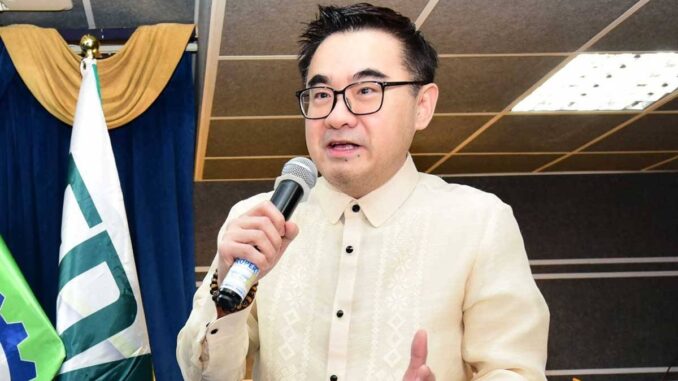
THE Philippines has the potential to become a top investment destination in Asia, but it must undergo a considerable transformation, Special Assistant to the President for Investment and Economic Affairs Frederick Go said.
During the “Malacañang Insider” program aired on Friday, Go expressed confidence about the Philippines’ economic performance as he highlighted his office’s priorities for attracting more investments into the country.
“It will take a lot of work and I think a lot of transformation of the way we do things to reach that level of being the number one investment destination in Asia,” Go said.
Special Assistant to the President for Investment and Economic Affairs Frederick Go Photo Photo courtesy to Philippine Economic Zone Authority
Go said neighboring Southeast Asian countries “have been cornering the lion’s share of global investments.”
“I’d like to make a difference. I’d like to reverse this trend and try to bring back our place as an investment destination in Asia,” he said.
Highlighting the country’s improving economic indicators, Go noted that a recent upgrade by a Japanese rating agency further supports the Philippines’ growing investment appeal.
“R&I just upgraded us a few weeks ago from BBB+ to A-. As you know, we have about five global credit rating agencies that rate countries all over the world. So, now, we have two Japanese rating agencies that have upgraded us to A-,” Go said.
“If we are able to bring the Philippines from what they call a B-level credit rating to an A-level credit rating, wow, that would be super for this country,” he added.
Go also said that 2024 is shaping up to be either the best or among the best years in the Southeast Asian region, with the Philippine gross domestic product growth for the second quarter at 6.3 percent.
“We’re doing very well as far as economic growth is concerned. Our unemployment numbers are down to 3.1 percent, which is one of the best numbers in the last two decades. Our poverty rate is likewise dropping,” Go said.
“So, if you’re asking me what I’m looking forward to, I’m looking forward to better economic growth numbers, better inflation numbers, and more upgrades, I hope, you know, within this administration,” he added.
Since the creation of the Office of the Special Assistant to the President for Investment and Economic Affairs (OSAPIEA) in December 2023, it has improved certain procedures in government agencies. These include the passing of the Public-Private Partnership Law, pre-border technical inspection of goods entering the country and digital invoicing at the Bureau of Customs, and the digitalization of the national ID.
The OSAPIEA is tasked to attract foreign direct investments into the Philippines.
Go said one of his office’s priorities is to push for the passage of the Create More Bill into law, saying it was important to address issues arising from its predecessor, the CREATE Act, which came into effect in April 2021.
The Corporate Recovery and Tax Incentives for Enterprises (Create) Act grants tax relief for companies in financial need in the wake of the Covid-19 pandemic while seeking to provide transparent tax provisions and further increase the competitiveness of the Philippines.
The Create More bill, meanwhile, seeks to improve regulations by enhancing tax and administrative incentives available to local and foreign companies. It likewise aims to clarify rules on implementing value-added tax (VAT) incentives introduced under the previous act.
“Passing the Create More bill… [signals] to the world that we are listening and are responding to the issues and difficulties that they have raised and brought to our attention,” Go said.
The House of Representatives passed the Create More bill on the third and final reading in May, while the Senate passed its version on the second reading early this month.
Go said another priority is the Luzon Economic Corridor Project, a collaboration with the country’s G7 Global Infrastructure partners.
He highlighted the flagship project, Subic-Clark-Manila-Batangas Cargo Rail, which would reduce the cost of doing business within the corridor, including four ports responsible for about 80 percent of the traffic volume in the Philippines.
“You can just imagine the number of industries that would benefit from this, that can be put in place around this corridor. We’re talking about renewable energy, data centers, food production, digital connectivity, and the like,” Go said.
“The Luzon Economic Corridor is the only project of its kind for the G7 here in Asia so we’re really hoping that this gains a lot of traction. In fact, one other country has already written us signifying interest to be part of the Luzon Economic Corridor,” he added.
Last week, Go said they were narrowing down the proposed projects under the Luzon Economic Corridor as the country’s partners shifted their interest to projects in Subic.
“The Corridor’s coverage is expanding so much so that the primary interest now is, for example, in Subic, which was not in the first steering committee meeting [in April],” Go said.
“I think we will end up with less than 10 primary projects. We’re shortlisting, or we’re narrowing, or we’re focusing now… That’s better. When you focus, then you know it will move forward faster,” he added.
The Philippines, Japan, and the United States announced the launch of the Luzon Economic Corridor during their trilateral meeting in Washington, D.C., in April this year.
The first Partnership for Global Infrastructure and Investment corridor in the Indo-Pacific, the Luzon Economic Corridor, aims to accelerate coordinated investments in high-impact infrastructure projects in Subic Bay.
These include projects in rail, port modernization, clean energy and semiconductor supply chains and deployments, agribusiness, and civilian port upgrades at Subic Bay.
In May, President Ferdinand Marcos Jr. said the government would do even better once the Luzon Economic Corridor was completed. CATHERINE S. VALENTE





Be the first to comment